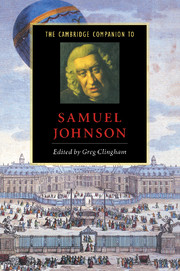Book contents
- Frontmatter
- Introduction
- 1 Extraordinarily ordinary
- 2 Johnson and the arts of conversation
- 3 Johnson's poetry
- 4 Johnson, the essay, and The Rambler
- 5 Johnson and the condition of women
- 6 Johnson's Dictionary
- 7 Johnson's politics
- 8 Johnson and imperialism
- 9 The skepticism of Johnson's Rasselas
- 10 Shakespeare
- 11 Life and literature in Johnson's Lives of the Poets
- 12 Johnson's Christian thought
- 13 “From China to Peru”
- 14 “Letters about nothing”
- 15 Johnson's critical reception
- Further reading
- Index
Introduction
Published online by Cambridge University Press: 28 May 2006
- Frontmatter
- Introduction
- 1 Extraordinarily ordinary
- 2 Johnson and the arts of conversation
- 3 Johnson's poetry
- 4 Johnson, the essay, and The Rambler
- 5 Johnson and the condition of women
- 6 Johnson's Dictionary
- 7 Johnson's politics
- 8 Johnson and imperialism
- 9 The skepticism of Johnson's Rasselas
- 10 Shakespeare
- 11 Life and literature in Johnson's Lives of the Poets
- 12 Johnson's Christian thought
- 13 “From China to Peru”
- 14 “Letters about nothing”
- 15 Johnson's critical reception
- Further reading
- Index
Summary
“He has made a chasm, which not only nothing can fill up, but which nothing has a tendency to fill up. - Johnson is dead. - Let us go to the next best: - there is nobody; - no man can be said to put you in mind of Johnson.” Thus the words of William Hamilton as reported by James Boswell at the end of his Life of Johnson (1791). In a sense Johnson scholarship has always been concerned with filling up the space left by Johnson's death in 1784; at the same time it has also been aware of the impossibility of that effort. Since Boswell's Life and the review of John Croker's edition of that work by Thomas Babington Macaulay in 1831 readers have internalized a certain set of physiological images and style of speech that have come to identify Johnson in the popular and even the academic mind. Perhaps more than any other English writer, including Shakespeare, Johnson's words have been quoted and misquoted in almost every form of public discourse, and his works have been interpreted and misinterpreted, not only by eighteenth-century scholars but by specialists in other areas. Johnson has been fair game for all. The attention he has received is the mark of many things: it is a sign that his personality continues to fascinate, that his works continue to speak to the experience of modern people, and that he and his works represent a complex cultural authority that provide some readers with deep, intelligent instances of moral, social, and literary insight, while symbolizing for others the worst excesses of absolutist and ethnocentric rationalism produced by the Enlightenment.
- Type
- Chapter
- Information
- The Cambridge Companion to Samuel Johnson , pp. 1 - 3Publisher: Cambridge University PressPrint publication year: 1997



